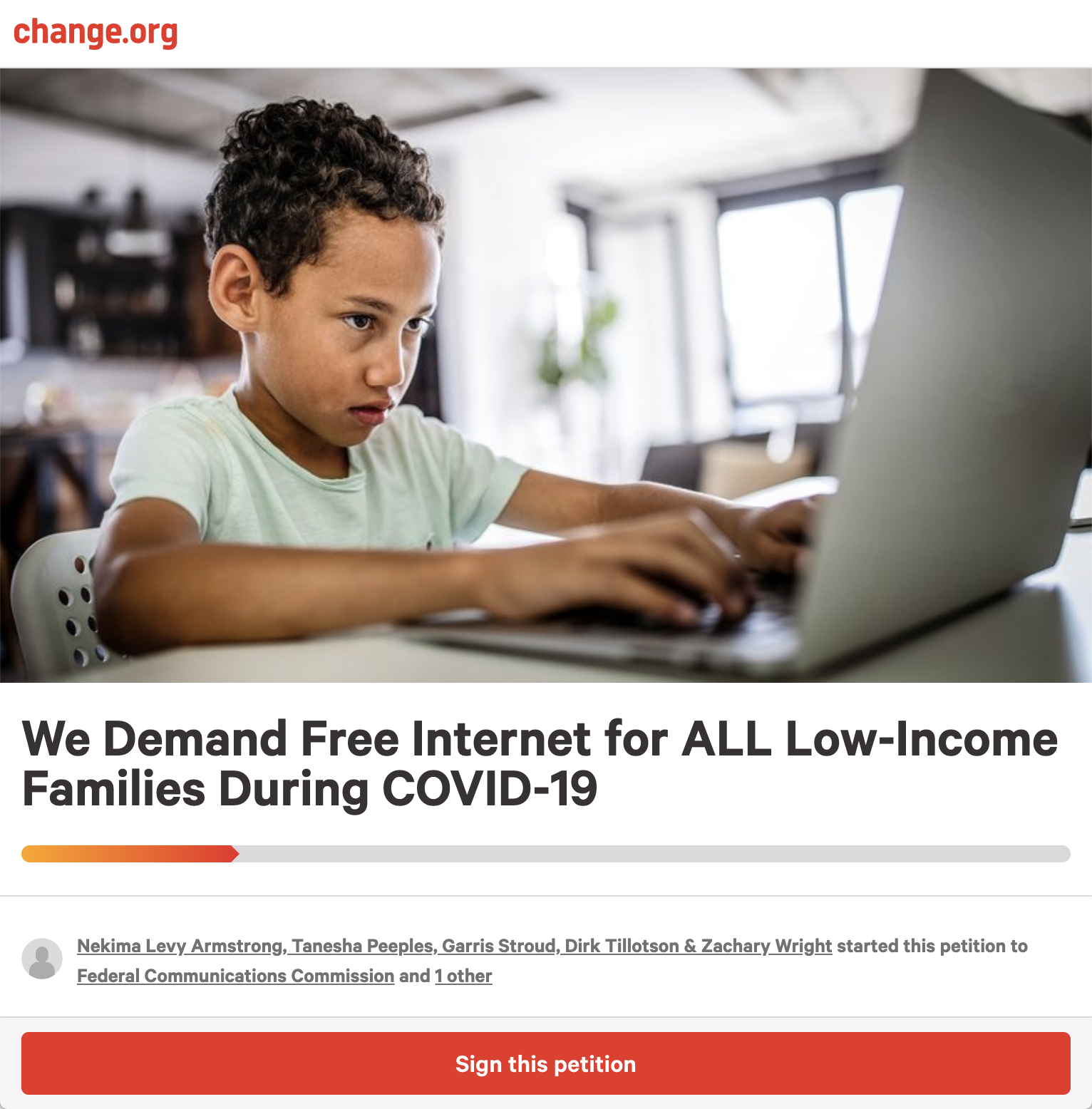
Mar 31, 2020 12:00:00 AM
Access to public education is now a fundamental right.
All 50 states mandate public education in their state constitutions. Once states made public education compulsory, they became responsible under the 14th Amendment to ensure equitable access to said education.
This means that no public school in the land can exclude students based upon race, religion, ethnicity, gender, creed or ability. While of course these protections have and continue to be fought for and re-established, the foundational legal principle is there.
If a student has a learning disability, the school is legally obligated to meet the needs of the child. If a student cannot walk up the stairs of the school, the school is legally obligated to build a ramp. If a student cannot afford food, schools are legally obligated to provide free or reduced-cost meals.
And now there’s another mode of access that needs to be added to this list, an internet connection.
During our COVID-19 world, education has become largely virtual. In order to access resources, classrooms, updates, and basically any type of communication or instructional learning, [pullquote]access to the internet is absolutely essential.[/pullquote]

Google Classroom, Classroom Dojo, Remind, Brainpop, ABCya—the list of online educational platforms goes on and on and on. In addition to these platforms, many districts are implementing real-time, synchronous classrooms via video platforms like Zoom.
These are all extraordinary pivots and exercises in resourcefulness and flexibility. Much of it, frankly, is absolutely amazing. But there’s a catch. For a student to learn using any of these platforms, they need an internet connection.
[pullquote]Inequitable access to the internet is not new, but its impact on student learning has never been more visible.[/pullquote] In Trenton, New Jersey, where learning is now fully online, 40% of students have not logged on to virtual learning sites—not surprising since, by the district’s own estimates, nearly 20% of students do not have computer access at home.
These inequities are magnified across the country as nearly 12 million students, more than one in five of all students in the country, lack home internet access. This means that one out of five students literally cannot go to school. That is unacceptable and, more so, a violation of these students’ rights to public education.
Right now, Comcast offers what is called “Internet Essentials” and it is woefully inadequate. For low-income families, Comcast offers a decent internet connection for about $10 a month, a computer for $150 and basic online training. Comcast has also made hotspots available to everybody, although these are usually located outside and in businesses, which are now off-limits.
These are generous offerings.
And yet, they’re not enough.
A wheelchair-bound student is not forced specifically to pay more in taxes to pay for the ramp that will provide her access to her school. A student with an IEP is not forced to pay to attend her IEP meetings. A student who does not have internet access at home should not have to pay to access their schoolwork.
For at least the duration of this school year, [pullquote]Comcast and all other internet providers need to make internet access absolutely free for all low-income families.[/pullquote] There is policy to support this already in the works and I strongly encourage everybody to join the Future Ready campaign.
There is no argument about whether it is affordable, not with a $2 trillion government bailout, nor is it any more a “hand-out” than is a wheelchair ramp.
It’s about ensuring that all students enjoy access to public education, period.
Zachary Wright is an assistant professor of practice at Relay Graduate School of Education, serving Philadelphia and Camden, and a communications activist at Education Post. Prior, he was the twelfth-grade world literature and Advanced Placement literature teacher at Mastery Charter School's Shoemaker Campus, where he taught students for eight years—including the school's first eight graduating classes. Wright was a national finalist for the 2018 U.S. Department of Education's School Ambassador Fellowship, and he was named Philadelphia's Outstanding Teacher of the Year in 2013. During his more than 10 years in Philadelphia classrooms, Wright created a relationship between Philadelphia's Mastery Schools and the University of Vermont that led to the granting of near-full-ride college scholarships for underrepresented students. And he participated in the fight for equitable education funding by testifying before Philadelphia's Board of Education and in the Pennsylvania State Capitol rotunda. Wright has been recruited by Facebook and Edutopia to speak on digital education. In the wake of the COVID-19 pandemic, he organized demonstrations to close the digital divide. His writing has been published by The Philadelphia Inquirer, The Philadelphia Citizen, Chalkbeat, Education Leadership, and numerous education blogs. Wright lives in Collingswood, New Jersey, with his wife and two sons. Read more about Wright's work and pick up a copy of his new book, " Dismantling A Broken System; Actions to Close the Equity, Justice, and Opportunity Gaps in American Education"—now available for pre-order!
Few issues in education spark more tension and debate than standardized testing. Are they a tool for equity or a burden on students? A necessary check on school systems or a flawed measure of...
Charter schools are public schools with a purpose. Operating independently from traditional school districts, they're tuition-free, open to all students, and publicly funded—but with more flexibility...
Despite the benefits of a diverse teaching force, prospective teachers of color fall out of our leaky preparation pipeline at every stage: preparation, hiring, induction, and retention. Here’s what...
Ed Post is the flagship website platform of brightbeam, a 501(c3) network of education activists and influencers demanding a better education and a brighter future for every child.
© 2020-2025 brightbeam. All rights reserved.
Leave a Comment